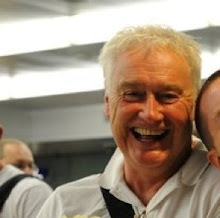Noel Coward Theatre

Coming off stage from a samba routine in which he’s obliged to remember the names of multiple South American dictators for the patter song, Simon Russell-Beale’s camp drag artiste Terri Dennis complains to his lyric writer “it’s not a fucking history lesson”. You could empathise with the audience in Peter Nichols’ layered and autobiographical piece about his days in Combined Services’ Entertainment during the 1948 ‘Malayan Emergency’ – defending the peninsula from Communist insurgents – which couldn’t be called a ‘war’ for fear of invalidating the Lloyds’ insurance policies of colonial rubber planters whose property was threatened.
On the surface, it’s an Eastwards-shifted ‘It Ain’t Half Hot, Mum’ where a troupe of stereotype squaddies puts on cheery and cheesy song-and-dance shows around Singapore while the guerrilla war rages up-country. All very fine and large, particularly SRB’s off-the-scale performance played eye-rollingly resolutely to the gallery, until their jingoistic commanding officer Major Flack (nice work by Angus Wright) in a mixture of home counties patriotism and Christian crusade decides to take them up the jungle to the heart of the action … “a theatre of war”.
In a programme note, Russell-Beale ponders how Olivier felt playing the vaudevillian Archie Rice in ‘The Entertainer' while required to appear second rate and said “I just did it as well as I could” which he claims is also his own intent. With corporeal amplitude barely constrained by a corset like industrial boiler plating, his caricatures rely on the elaborate costumes and army budget-busting wigs to impersonate Carmen Miranda, Marlene Dietrich and Vera Lynn: they’re well observed but may also feel a bit like being force-fed a box set of Two Ronnies finales.
Print critics rushed to hand out five-star accolades, bloggers were more cautious and some clearly shifted uncomfortably in their seats at the casual racism and denigration of women which may have been accurate for 1948, but post-Iraq and Afghanistan our attitude to time-serving British soldiery has also shifted, and the belly laughs weren’t as universal as they were at the original production in 1977.
Billed as a musical, it’s more a play with ‘turns’ since the songs don’t advance the action or reflect the thoughts of the characters and at two and three-quarter hours it's a stretch, although in the darker second act the ambush of the theatre troupe, the revenge of the communist-sympathising silent Chinese servants, and a poignant romance provide strength and depth to the play beneath the frills and the frocks.
Definitely worth a look, and bravo to the Michael Grandage Company for offering a range of ticketing options including 5-for-4 play subscriptions, and some reasonably priced day seats. Shop around.
written for Londonist and published on 11 December 2012




















LauraPittPulford(Mabel)RichardJHunt(FattyArbuckle)PhotoAnnabelVere.jpg)

+-+Credit+Manuel+Harlan.jpg)








